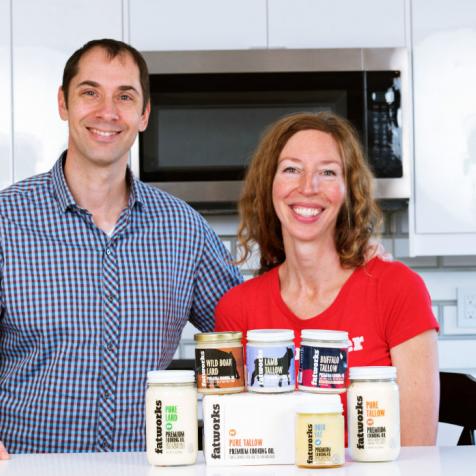
Company Details
Location
Denver, Colorado
Founded
2011
Ownership Type
Private
Employees
3
Products
Lard and fat
Denver
Founded: 2011
Privately owned
Employees: 3
Industry: Food & Beverage
Products: Lard
Without any previous culinary experience, married co-founders David Cole and Mieke Schierer have cashed in on the Paleo movement by filling glass jars with fat.
Well, not just any fat: artisanal fat. "What we've done is created a new category of premium fats," explains Cole, the company's fatworker-in-chief, which we surmise is very similar to a CEO.
Cole, Schierer, and a third business partner, Craig Combs, started eating Paleo before it was hip, and they were blown away by the health benefits they experienced.
"One of the tenets of Paleo is to embrace fat," Cole explains. "You go through a phase of eating coconut oil, and then you get sick of that."
Next, lard, tallow, and duck fat are part of the diet, too. "But we could never find those products in stores," says Cole. So he decided he'd make it himself.

Cole was already an entrepreneur, but his other service-based company operates in the tech industry -- a far cry from food, where business owners are tasked with developing tangible products.
"We were very naive going into this whole thing," Cole admits, adding, "We didn't even realize that to sell the stuff wholesale we'd have to process it in a USDA kitchen."
As luck would have it, there was a small-batch commissary in Denver -- Kitchen Network Bottling Company -- and the organization's USDA-approved facility ended up being a perfect co-packing partner.

This next bit is important: Not all lard is good lard.
That's why Fatworks sources animal fats from a network of 20-plus pasture-raised, non-GMO family farms. When Cole first started reaching out to potential suppliers, most of the farmers were really surprised that somebody wanted their fat. "At the time, fat was shunned," Cole says.
Today, Cole works with a few Colorado farms, including Crystal River Meats, and Polyface Farms in Virginia, featured in the award-winning documentary Food, Inc.
Shipping fat to a freezer in Denver can be a logistical headache. "It could take several months or more to get a pallet of fat to us, which isn't very much, maybe 1,000 pounds," says Cole.
Fat arrives frozen to Kitchen Network Bottling, where it's stored cold until it's ready to be processed. Manufacturing involves melting, rendering, filtering, and bottling the fat. "It's really close to how you'd do it at home, in a stockpot," Cole says, adding, "It's actually a very simple process, and that's the way we want it."

A lot of the competition puts out overly processed lard that's bleached and hydrogenated. If your lard comes in a wrapper, like butter, well that's a bad sign.
"Our innovation is glass," explains Cole. Packing fat in glass bottles is expensive, but it's worth it. "We're making a premium product," says Cole. "We were the first to do that really."
Fatworks opened with its "Pure Tallow" cooking oil, which is made from cow fat, and has since added lard (a.k.a. pig fat) and duck fat, too, the latter of which is unique because "duck farming is a little antiquated," as Cole puts it.
The company didn't even have a website when it launched, just a Facebook page that would have baffled the cavemen, and a hunch that if Cole, Schierer, and Combs wanted premium-quality fats, others would want them too.

And the entrepreneurs were right. Fatworks advertised through bloggers in the Paleo community, siphoning fans off their social media networks. "I got our product into the hands of the right bloggers, and suddenly the business exploded," Cole recalls. "Now we can hardly keep up with the orders."
Cured, a gourmet grocer in Boulder, was the first retailer to stock Fatworks. A few years later, the brand is sold in just over 1,000 stores nationwide, and does a mix of wholesale shipments and direct-to-consumer sales via Amazon.
And it's no longer just Paleo peeps who can't get enough Fatworks. Notes Cole, "Gourmet food suppliers and bakers love our fats for the flavor."

Challenges: There are three, Cole says: sourcing really good product, scaling, and dealing with copycats. "We created this market, and all of a sudden there have been cheap imitations popping up," he says.
Opportunities: Cole sees a potential to play with packaging, putting lard in, say, buckets for local restaurants. The company is also working on expanding its offerings, developing value-added products that would rely on Fatworks lard as a key ingredient.
Needs: "We need more good farms creating high-quality fat," says Cole. "We also need to generate more awareness of how great fat can be for you, in the right context."
